Reforms are sweeping through the Australian electricity industry. As part of its Power of Choice (PoC) program, we will see massive changes to the way the industry manages meters and meter data. In most countries around the world, it is the network part of a Utility who is responsible for managing meters and meter data. In Australia, from December 2017, the responsibility will move to the energy retailer.
Things get a little more complicated. While energy retailers will be responsible for the management of metering and meter data they will have to appoint a third party called a Metering Coordinator (MC) to execute on most of the activities associated with this. Since this regulatory change was announced, market participants such as energy retailers, network businesses and meter vendors have had to decide if they want to create a MC business.
We have seen some of the big retailers create meter service businesses. AGL introduced ActiveStream and Origin leveraged their existing metering business called Acumen. Landis & Gyr, one of the world’s leading meter manufacturers, created IntelliHub while existing meter service providers such as Metropolis and Vector looked to expand their market share.
There were many in the industry who convinced themselves that there would be a rapid roll out of large volumes of smart meters. Many believing being an MC was key so they could own the end to end metering and meter data ecosystem. With so much uncertainty and differing opinions, any decision was a calculated risk.
More recently I have heard that several metering businesses are being put up for sale in some shape or form. To most of the peers I talked to, this comes as no surprise, but if this is true it does beg two questions:
Who would buy them, and why?
The value in smart meters is making use of its features, such as remote connect and disconnect, and of course, gaining insights from the energy data. There is little value in the business of metering and meter data provision in a small market like Australia. There are a bunch of rules around what it can and cannot do. With so little scope to differentiate this essentially becomes a commodity. As with all commodities, it’s going to be a race to the bottom to see who can offer the lowest price.
To succeed the Metering Coordinator needs to come up with value-added services. I won’t be surprised if we end up with just one or two players left standing in a few years from now.
Let’s hope this all settles down quickly, the consumer deserves our industry’s experts focused on the real opportunities enabled by smart meters, not who is best to install and manage them.
How do you see the future of electricity metering play out in Australia?
.
.
In our book ‘utilidocs™, building blocks to a Digital Utility’ we describe how you can leverage energy data to deliver new and improved services. Get your paperback or kindle version here. All profits go to Solar Sisters.
.
#connectedera #digitalutility #smartmeters #demandresponse #opendata #demandsidemanagement #DSM
.
Contact me to find out how we help electricity companies use energy data to deliver customer value.
.

When working for NSW Treasury, I sought to champion (against the powers of darkness at the time) a policy of contestability in metering. The mechanism was to be simple in principle (although it has taken an inordinate time to bring it close to fruition): the network operator was to be obliged to provide metering, while the retailer was to be entitled to take on responsibility for it. This reflected the anticipated industry dynamics – accommodating and encouraging (but without forcing prematurely) developments in technology, big data, communications and artificial intelligence, as and when economics enabled, and also projecting some competitive productivity pressures on the incumbent networks.